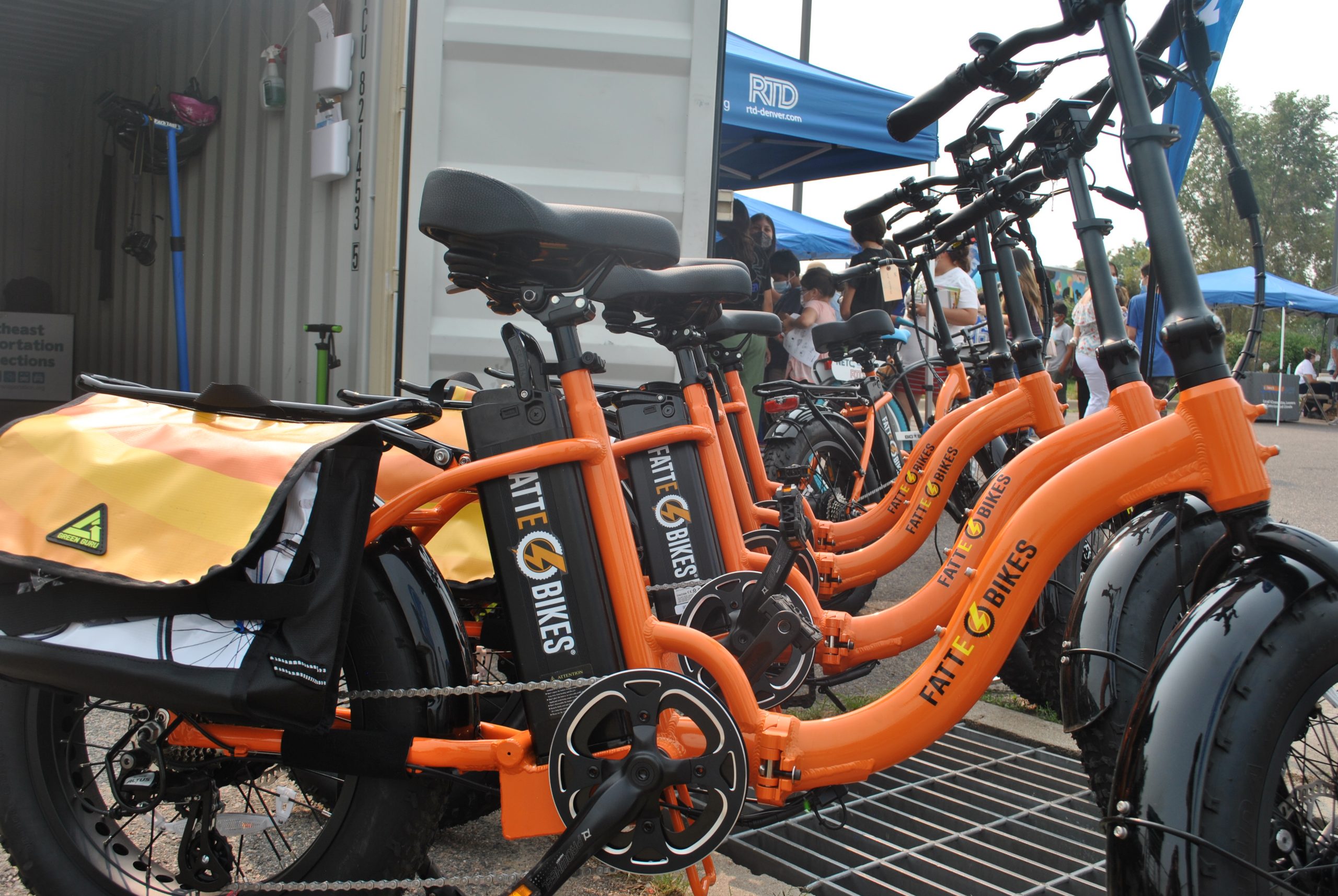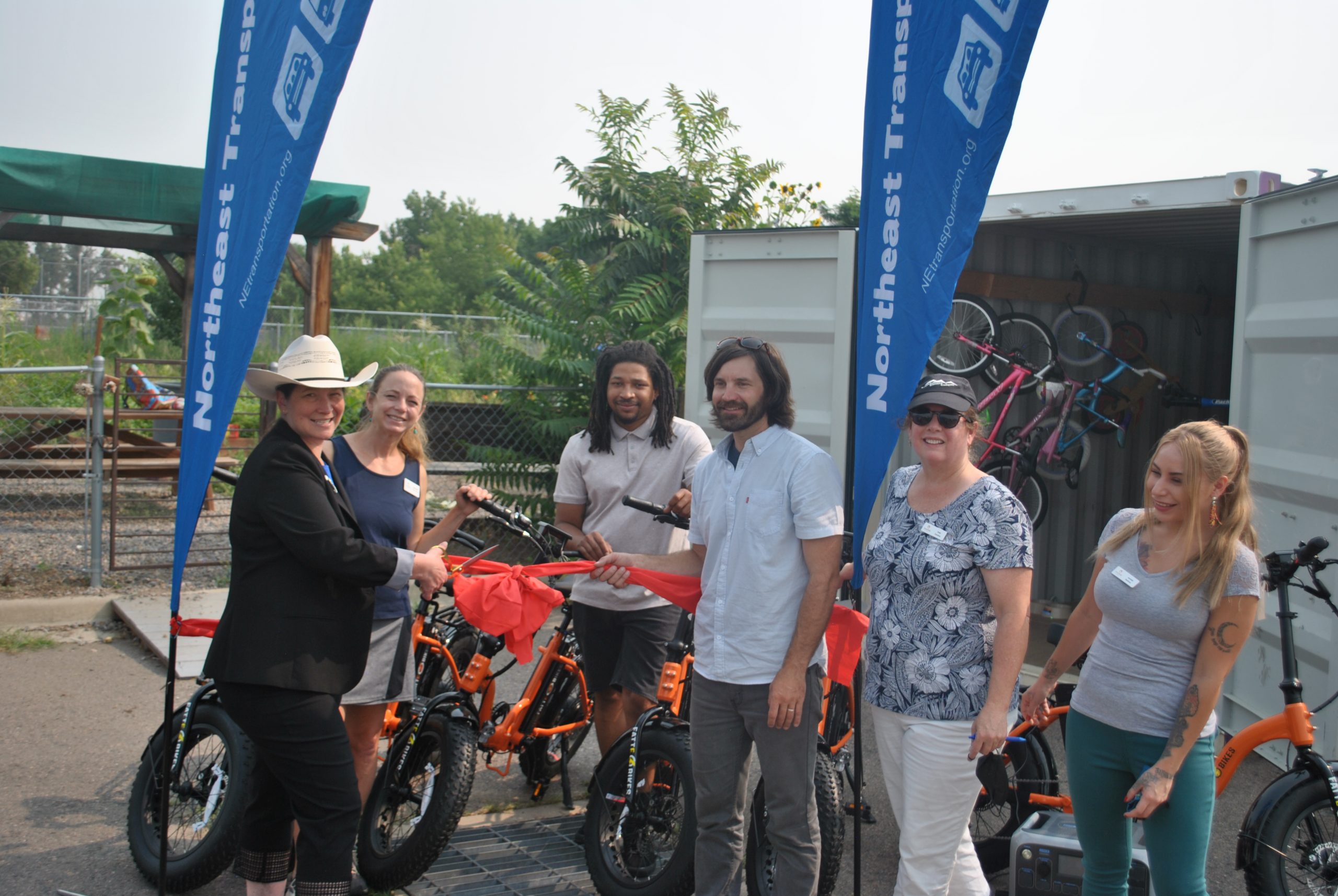
Denver’s first e-bike library, managed by Northeast Transportation Connections, launched August 7 to support essential workers with their commutes. Credit: Office of Climate Action, Sustainability, and Resiliency City and County of Denver (CASR)
The Oakland Department of Transportation (OakDOT) plans to introduce an electric bike lending library in the first quarter of next year, providing low-income residents an opportunity to borrow a set of wheels for faster and longer trips to jobs, transit, stores, and other destinations.
OakDOT was awarded $1 million in June as part of a statewide initiative — the Clean Mobility Options Voucher Pilot Program — to develop and launch zero-emission mobility projects that help residents overcome transportation challenges in their communities.
“The majority of Oaklanders want to bike more but are held back by barriers, including lack of access to bikes,” said Kerby Olsen, new mobility supervisor at OakDOT.
Oakland has been part of a regional bike-sharing system since 2017 that relies on standard pedal bicycles to help reduce car dependence. But those models can’t address every bike mobility need, including riders with disabilities or people transporting goods requiring the electric pedal assist.
OakDOT plans to use the funds to purchase 500 e-bikes, including cargo, folding, and adaptive models, to create the Oakland E-Bike Lending Library. It’ll make them available to low-income adults living in West and East Oakland, Chinatown, and Fruitvale for medium or long-term rental at low cost through existing bike shops.
E-bikes are increasingly embraced due to their efficiency and sustainability. U.S. e-bike sales totaled $546.7 million in 2020, up from $237.6 million the prior year, according to market research firm NPD Group.
For their part, transportation officials are investing in them to boost resources that improve quality of life and reduce air pollution and greenhouse gas emissions affecting vulnerable populations. A 2019 study by Portland State University researchers found that if 15 percent of car trips were made by e-bike, carbon emissions would fall 12 percent.
The idea for Oakland’s new library came from OakDOT’s 2019 bike transportation plan, “Let’s Bike Oakland,” Olsen said. It found that most Oaklanders want community programs that promote hometown efforts that encourage biking, support the local bicycling economy, and provide access to shared resources for needs such as bike maintenance.
OakDOT is working with GRID Alternatives Bay Area, an Oakland nonprofit group that provides renewable energy programs in underserved communities, to roll out the e-bike lending library.
GRID is helping to purchase the e-bikes, as well as locks, helmets, and lights. It’s also handling other logistics like subcontracting with about a half dozen bike shops in Oakland’s disadvantaged communities where riders can check bikes in and out. Oakland’s e-bike lending library also will have electric scooters in circulation.
Bike shops will “be the customer face of the program and provide the maintenance on the bikes,” Olsen said. He added that they’d help fit people to the appropriate bike, provide them a helmet and lock, and demonstrate how to ride and secure bikes.

Credit: Office of Climate Action, Sustainability, and Resiliency City and County of Denver (CASR).
Outside the region, Denver transportation officials launched a similar e-bike lending initiative on August 7 aimed at helping essential workers. “It’s a balance to get bikes into the hands of people that need and use them while making sure they’re protecting the asset at the same time,” said Eric Herbst, assistant director of Denver-based Northeast Transportation Connections (NETC). The nonprofit organization manages Denver’s e-bike libraries.
Denver’s program, which launched August 7, is part of a partnership with two community-based organizations that will house 10 bikes apiece at their respective libraries. Being built by FattEBikes in Denver, the bikes will be free to check out for about a week at a time, Herbst said.
Riders “have to bring it back after a week, and if bikes are available, they can swap it out,” Herbst said.
Each bike’s GPS is recharged upon return. The GPS helps with navigation, aids in recovery if a bike is stolen, and provides data to policymakers about the number of miles logged. The Climate Protection Fund, run by Denver’s Office of Climate Action, Sustainability and Resiliency (CASR), invested in the e-bike lending program to help reduce climate change impacts like poor air quality.
“It’s a new thing for the City of Denver and we’re hoping to learn a lot” from the newly launched library projects,said Mike Salisbury, transportation energy lead at CASR.
While OakDOT and GRID are still working on Oakland’s e-bike lending specifics, Olsen said he envisions an experience in which residents will use an online platform to make bike reservations. They also could call GRID directly. GRID will then distribute bikes to the shops based on demand.
Riders will pay to check out e-bikes, although the exact pricing structure isn’t yet determined. Factors such as income or neighborhood could determine the rate, Olsen said. Community outreach planned for this fall will offer a chance for residents to provide input on cost and the maximum time for bike check out.
In the meantime, there isn’t a local apples-to-apples e-bike rental rate comparison, although San Francisco-based transportation company Lime does rent e-scooters in Oakland. It offers residents who qualify for federal or state subsidies a 70 percent discount off standard rates through its Lime Access program, according to Lime spokesman Jacob Tugendrajch. The standard cost is $1 to unlock a scooter and 36 cents per minute thereafter.
Outside of renting, certain price cuts could compel some people toward purchasing their own bikes. Like electric vehicles, e-bikes come with incentives. For example, qualifying Bay Area residents can ditch their old car for a $7,500 grant to purchase an e-bike through the state’s Clean Cars for All Program, according to the Bay Area Air Quality Management District’s website.

